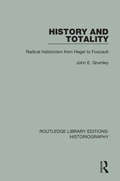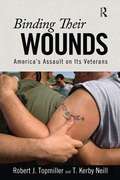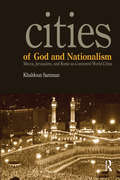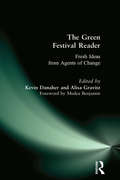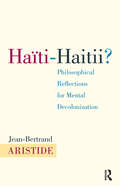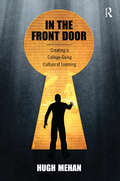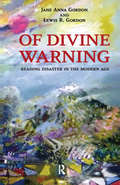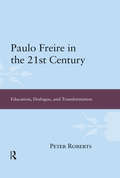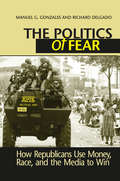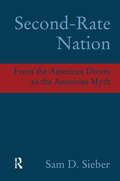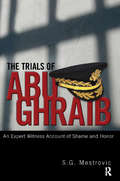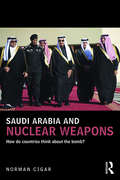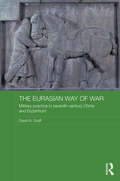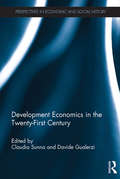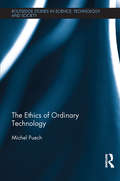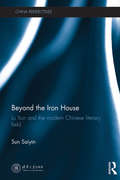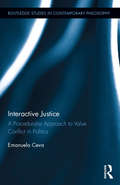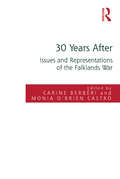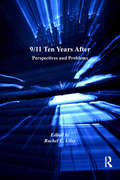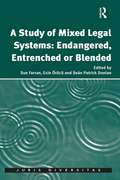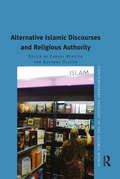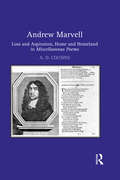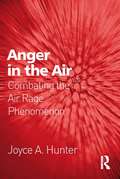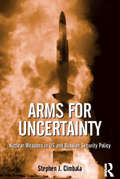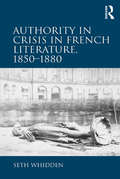Special Collections
Benetech’s Global Certified Accessible Titles
Description: Benetech’s GCA program is the first independent third-party EPUB certification to verify ebook accessibility. By creating content that is born accessible, publishers can meet the needs of all readers. Learn more: https://bornaccessible.benetech.org/
- Table View
- List View
History and Totality
by John GrumleyIn this work, originally published in 1989, the author establishes a tradition of radical historicism from Hegel to the Budapenst School. He charts both its continuous evolution from the early 19th century to the late 20thh, and its transformation in the context of European social, economic and cultural change. Through a reappraisal of historical interpretation from Hegel to Foucault, the book demonstrates the contemporary relevance of radical historicism. It includes detailed analyses of Marx, Dilthey, Simmel, Weber, Lukácks, Horkheimer, Adorno and Habermas.
Binding Their Wounds
by Robert J. Topmiller and T. Kirby NeillThe victims of US military campaigns are usually nameless civilians in far away places, but there are also victims closer to home - the soldiers so often used and then discarded by the establishment. Binding Their Wounds is a book about US veterans written by a US veteran - Bob 'Doc' Topmiller. Topmiller fought in Vietnam, founded a school for orphans there, and become a professor of history before he tragically committed suicide. Close friend and scholar Kerby Neill stepped in to complete the book. The result is a history of US veterans and their treatment by the US establishment from the early republic to the recent wars in Iraq and Afghanistan. Binding Their Wounds offers policy recommendations to improve post-conflict treatment and care for veterans which are long overdue.
Cities of God and Nationalism
by Khaldoun Samman"A tour-de-force in different fields of knowledge. It takes world-city and world-history literatures to a higher level of depth and understanding. It is difficult to imagine a more pioneering, in-depth study of world cities." Ramon Grosfoguel, Professor, Department of Ethnic Studies, University of California, Berkeley "A remarkable and original discussion of three great sacred cities across time, and their transformation by nationalism in the modern world." Immanuel Wallerstein, Yale University Far from spawning an age of tolerance, modernity has created the social basis of division and exclusion. This book elaborates this provocative claim as it explores the rich but divided histories of three cities located at the crossroads of Islam, Christianity, and Judaism. Many observers presume that violence is built into these sacred cities because their citizens cling to religious or cultural ideals of some archaic age; only when this history is overcome can citizens enter a new age of brotherhood. Samman persuades us to refocus our attention on modernity, which has instilled troubling dilemmas from the outside. He shows how these sacred places long ago entered the modern world where global political and economic forces exacerbate nationalism and regional divisions. If we are to resolve deep conflicts we must re-imagine the institutional basis on which modernity, rather than religion, is built.
Green Festival Reader
by Kevin Danaher and Alisa Gravitz and Medea BenjaminEach year, Green Festivals across the nation draw over 100,000 people to their “party with a purpose.” The Green Festival Reader: Fresh Ideas from Agents of Change presents the addresses of the foremost thinkers and activists at these popular events. From a green New Deal to healthy homes and community empowerment, The Green Festival Reader covers the most urgent and inspiring topics in today’s environmental movement.
Haiti-Haitii
by Jean-Bertrand AristideIn Haiti - Haitii Jean-Bertrand Aristide combines the artistry of Swahili with the poetic incisiveness of his native Kreyol to produce an eloquent critique of colonialism and an affirmation of humanist principles. Aristide uses poetry, prose and proverbs to tell the epic story of Haiti, the world's first independent Black republic. He chronicles the brutality of the colonisers and the ways in which they attempted to dehumanise Haitians. Aristide illustrates how Haitians' 300-year journey to freedom has been guided by the African philosophy of Ubuntu, a world view that emphasises human solidarity. Today, Aristide writes, it is this same philosophy that can empower a new generation of Africans to resist neo-colonialism. This book is the inspiring inside story of the country which has both suffered in unimaginable ways and dared to dream of freedom. It will be essential reading for all those interested in the past, present and future of Haiti and the prospects for national liberation across the world in the 21st century.
In the Front Door
by Hugh MehanThis book provides a critical analysis of the origins, nature, development, and transformation of the state and society historically and today, examining the class nature and social basis of politics and the state in different societal settings. The book emphasizes the centrality of class relations in explaining political power and the role of the state in class-divided societies by providing powerful theoretical and empirical analyses of themes in political sociology in an era of globalization. It examines in detail the major political issues and events of our time, and makes them relevant to the study of power and politics today. Students from many ethnic minority backgrounds and low-income families are underrepresented in American colleges and universities. This book describes and assesses educational policies and practices that seek to rectify this important manifestation of structured inequality. Inspired by a commitment to providing a pathway to college and beyond, Mehan and his team document the innovate practices developed and implemented at the nationally recognized schools created by The Center for Research in Educational Equity, Access, and Teaching Excellence (CREATE) at the University of California-San Diego: the Preuss School, a 6-12 charter school on the UCSD campus for underrepresented minority students; and nearby schools located in economically depressed neighborhoods. Based on long-term research, Mehan's book makes important contributions to the literature on educational achievement disparities that exist-and are growing-within the United States. He sheds light on how we can improve public policy for the futures of secondary school students.
Of Divine Warning
by Lewis R. Gordon and Jane Anna GordonThis book offers a theory of disaster in modern and contemporary society and its impact on the construction of social and political life. The theory is premised upon what the authors call "the sign continuum," where disaster spreads across society through efforts to evade social responsibility for its causes and consequences. Phenomena generated by such efforts include the social manifestation of monstrosity (disastrous people and other forms of living things) and an emerging antipolitics in an effort to assert rule and order. A crucial development is the attack on speech, a fundamental feature of political life, as manifested by the increased expectations of categories of people whose containment calls for shunning and silence.
Paulo Freire in the 21st Century
by Peter RobertsThis book explores the implications of world renowned educationalist Paulo Freire's theories for educational practice and how his ideas can help in bridging different genres and traditions. It addresses themes, questions and issues that have received little attention to date, including Freire's conception of the critical intellectual, the problem of defining literacy, and the possibility of a Freirean response to debates over political correctness. Roberts also relates Freire's ideas to those of other writers: Israel Scheffler, Fyodor Dostoevsky and Hermann Hesse, among others. Paulo Freire in the 21st Century makes a distinctive contribution to the international literature on Freire's work.
Politics of Fear
by Richard Delgado and Manuel G. Gonzales"Lucidly written, widely informed, and uncompromisingly honest -- a valuable expose." Michael Parenti "Documents the stunning success of a network of wealthy donors and corporations in creating and sustaining a set of think tanks, legal action groups, and media strategies." Gary Orfield, Harvard University What explains the electoral success of Republicans, particularly of the ascendant neoconservatives who now dominate the Party? Based on a thorough and up-to-date examination of the New Right over twenty-five years, The Politics of Fear proposes some provocative answers, including globalization, new technologies, and a far-reaching network of right-wing think tanks and foundations. As the authors show, all have opened the doors to a new politics of fear successfully waged by the neoconservatives. By manipulating insecurity, the New Right has created an extraordinarily successful populist conservative movement. Utilizing extensive documentation, the authors argue convincingly that the fear of immigrants and racial minorities has served as the most effective tactic in the GOP arsenal, while their approach also implicates gays, feminists, and terrorists. The book explains why Americans have willingly supported a party that promises them security, just as it delivers greater economic and political insecurity. The authors argue that, despite their striking political successes, neoconservatives have delivered to voters a set of policies harmful to working Americans in the way of regressive tax measures, military exploits, tort reform, deregulation, and environmental destruction.
Second-Rate Nation
by Sam D. SieberA scathing indictment of America's failure to keep up with other advanced nations and to achieve its own most cherished goals. The chapters of the book focus on: the media, the economy and corporations, foreign assistance and military affairs, health and health care, education, crime and punishment, the environment, inequality, and more. This is the one book to read this year about current events and the United States' many recent failures, which have demoted them to the status of a second-rate nation. The book will be useful for policymakers, journalists, teachers, students, activists and public speakers, and anyone with an interest in the U.S. today. Drawing on copious international and domestic evidence, the author shows that America lags significantly behind other advanced countries in such domains as health care, education, crime, civil liberties, racial and ethnic equality, environmental protection, foreign relations, and key features of the economy, including persistent poverty. The gap extends even to some surprising areas: press freedom and democratic representation. Sieber examines the questions of how and why the peculiar gulf between America's extraordinary self-esteem and the true state of affairs has evolved. He is concerned with understanding how the nation's idealized self-image is sustained in spite of overwhelming evidence of impairment in almost every important domain. In an election year the book is a valuable resource for assessing the challenges the U.S. faces. Apart from the author's powerful thesis, the book is a rich compendium of up-to-date statistical data on a variety of issues, presented without either technical obfuscation or oversimplification. It should therefore be useful to policymakers, journalists, commentators, teachers, students, activists, public speakers, and anyone wishing to know more about the true state of affairs in the U.S. today.
Trials of Abu Ghraib
by S. G. Mestrovic'Offers a front row seat at the courts martial of those accused in America's notorious prison abuse scandal.' -Adam Zagorin, senior correspondent, Time Magazine 'A must-read for all those committed to restoring a sense of honor to our country and the Armed Forces of the United States following the national embarrassment of Abu Ghraib. The unlawful directives and policies issued by the senior civilian leaders in the Department of Defense, and their flawed strategy that took our nation to war, set the conditions for abuse that would have disastrous consequences on the war in Iraq and the future of the Middle East. Amazingly, as of this writing, senior leaders have yet to be held accountable. Read this book, become better informed, and energize your elected officials to do the right thing.' -Major General John Batiste, U.S. Army (Retired) S. G. Mestrovic's story of three principal trials-those of convicted soldiers Lynndie England, Javal Davis, and Sabrina Harman-stands among the most poignant trial narratives ever told. During the trials Mestrovic, an expert witness on behalf of the three soldiers, had access to documents and records unavailable to the press and the public. He reveals the evidence, some suppressed from testimony, that the abuse at Abu Ghraib is part of a widespread pattern of abuse, imported from Guantanamo, that made its way to Afghanistan and Iraq.
Saudi Arabia and Nuclear Weapons
by Norman CigarNuclear proliferation in the Middle East remains an issue of concern. Saudi Arabia’s actions will largely rest on Iran’s decisions, and discussions and preparations within Saudi Arabia would suggest that it is ready to react to potential shifts in the region’s nuclear powers. Saudi Arabia and Nuclear Weapons uses an "inside out" approach that emphasises the Saudis’ own national interests in relation to the nuclear threat, and their understanding of the role of nuclear weapons in defense, foreign policy and the concept of deterrence. It is the first study with comprehensive use of the local Arabic language military and civilian media to provide this understanding of official thinking and policy. The Saudi case study is contextualised against the prevailing proliferation models, to conclude that the Saudi case shares both commonalities and elements of uniqueness with other proliferation cases, implying the need for a ‘multi-causal’ approach. Its comparative analysis also suggests potential implications applicable more broadly to the issue of nuclear proliferation. A comprehensive study of Saudi Arabia’s attitude to nuclear weapons, this book offers an exploration of nuclear proliferation that would interest students, scholars and policymakers working in Middle East studies, as well as Military and nuclear proliferation studies.
The Eurasian Way of War
by David A. GraffThis book is a comparative study of military practice in Sui-Tang China and the Byzantine Empire between approximately 600 and 700 CE. It covers all aspects of the military art from weapons and battlefield tactics to logistics, campaign organization, military institutions, and the grand strategy of empire. Whilst not neglecting the many differences between the Chinese and Byzantines, this book highlights the striking similarities in their organizational structures, tactical deployments and above all their extremely cautious approach to warfare. It shows that, contrary to the conventional wisdom positing a straightforward Western way of war and an "Oriental" approach characterized by evasion and trickery, the specifics of Byzantine military practice in the seventh century differed very little from what was known in Tang China. It argues that these similarities cannot be explained by diffusion or shared cultural influences, which were limited, but instead by the need to deal with common problems and confront common enemies, in particular the nomadic peoples of the Eurasian steppes. Overall, this book provides compelling evidence that pragmatic needs may have more influence than deep cultural imperatives in determining a society’s "way of war."
Development Economics in the Twenty-First Century
by Claudia Sunna and Davide GualerziDevelopment Economics has been identified as a homogeneous body of theory since the 1950s, concerned both with the study of development issues and with the shaping of more effective policies for less advanced economies. Development Economics in the Twenty-First Century brings together an international contributor team in order to explore the origins and evolution of development economics. This book highlights the different elements of ‘high development theory’ through a precise reconstruction of the different theoretical approaches that developed between the 1950s and the 1970s. These include the theory of balanced and unbalanced growth theory, the debate on international trade, the concept of dualism, dependency theory, structuralism and the analysis of poverty and institutions. The chapters highlight the relevance and usefulness of these analyses for the contemporary theoretical debate on development issues. Comparative perspectives are explored and analysed, including those of Keynes, Hirschman, Krugman and Stiglitz. The chapters situate development economics within current debates among economists and historians of economic thought, providing a platform for future research. This book is suitable for researchers and students with an interest in Development Economics, the History of Economic development and the Economics of Developing Countries.
The Ethics of Ordinary Technology
by Michel PuechTechnology is even more than our world, our form of life, our civilization. Technology interacts with the world to change it. Philosophers need to seriously address the fluidity of a smartphone interface, the efficiency of a Dyson vacuum cleaner, or the familiar noise of an antique vacuum cleaner. Beyond their phenomenological description, the emotional experience acquires moral significance and in some cases even supplies ethical resources for the self. If we leave this dimension of modern experience unaddressed, we may miss something of value in contemporary life. Combining European humanism, Anglophone pragmatism, and Asian traditions, Michel Puech pleads for an "ethical turn" in the way we understand and address technological issues in modern day society. Puech argues that the question of "power" is what needs to be reconsidered today. In doing so, he provides a three-tier distinction of power: power to modify the outer world (our first-intention method in any case: technology); power over other humans (our enduring obsession: politics and domination); power over oneself (ethics and wisdom).
Beyond the Iron House
by Saiyin SunBeyond the Iron House is a critical study of a crucial period of life and work of the modern Chinese writer Lu Xun. Through thorough research into historical materials and archives, the author demonstrates that Lu Xun was recognized in the literary field much later than has hitherto been argued. Neither the appearance of "Kuangren riji" (Diary of a madman) in 1918 nor the publication of Nahan (Outcry) in 1923 had catapulted the author into nationwide prominence; in comparison with his contemporaries, neither was his literary work as original and unique as many have claimed, nor were his thoughts and ideas as popular and influential as many have believed; like many other agents in the literary field, Lu Xun was actively involved in power struggles over what was at stake in the field; Lu Xun was later built into an iconic figure and the blind worship of him hindered a better and more authentic understanding of many other modern writers and intellectuals such as Gao Changhong and Zhou Zuoren, whose complex relationships with Lu Xun are fully explored and analysed in the book.
Interactive Justice
by Emanuela CevaContemporary societies are riddled with moral disputes caused by conflicts between value claims competing for the regulation of matters of public concern. This familiar state of affairs is relevant for one of the most important debates within liberal political thought: should institutions seek to realize justice or peace? Justice-driven philosophers characterize the normative conditions for the resolution of value conflicts through the establishment of a moral consensus on an order of priority between competing value claims. Peace-driven philosophers have concentrated, perhaps more modestly, on the characterization of the ways in which competing value claims should be balanced, with a view to establishing a modus vivendi aimed at containing the conflict. Interactive Justice addresses an important question related to this debate: on what terms should the parties interact during their conflict for their interaction to be morally acceptable to them? Although largely unexplored by political philosophers, this is a main area of concern in conflict management. Building on a proceduralist interpretation of "relational" concerns of justice, the author develops a liberal normative theory of interactive justice for the management of value conflict in politics grounded in the fundamental values of fair hearing and procedural equality. This book innovatively builds a bridge between works in political philosophy and peace studies to propose a fresh lens through which to view the normative responses liberal institutions ought to give to value conflict in politics, and moves beyond the apparent dichotomy between pursuing end-state justice through conflict resolution or peace through conflict containment.
30 Years After
by Carine Berbéri and Monia O’Brien CastroThirty years after the Argentinian invasion of the Falkland Islands, the war remains a source of continued debate and analysis for politicians, historians and military strategists. Not only did the conflict provide a fascinating example of modern expeditionary warfare, but it also brought to the fore numerous questions regarding international law, sovereignty, the inheritance of colonialism, the influence of history on national policy and the use of military force for domestic political uses. As the essays in this collection show, the numerous facets of the Falklands War remain current today and have ramifications far beyond the South Atlantic. Covering issues ranging from military strategy to Anglo-American relations, international reactions and international law to media coverage, the volume provides an important overview of some of the complex issues involved, and offers a better understanding of this conflict and of the tensions which still exist today between London and Buenos Aires. Of interest to scholars of history, politics, international relations and defence studies, the volume provides a timely and forthright examination of a short but bloody episode of a kind that is likely to be seen with increasing frequency, as nations lay competing claims to disputed territories around the globe.
9/11 Ten Years After
by Rachel E. UtleyTen years on, what have been the principal impacts of the terrorist attacks of 11 September 2001 on the external policies and international outlooks of the world's major powers, the range and scope of the international security agenda and on the capacity for states and international organisations to work together to combat the dangers of international terrorism? This book investigates a range of international responses to the events of 9/11, to evaluate their consistency over time; to analyse their long-term significance and impact and to consider both their implications for the international security agenda and the prospects for international cooperation in addressing the challenges posed. In particular, the book considers the perspectives of some of the world's major powers and international organisations on the question of international terrorism, and on its perpetrators, comparing their interpretations and responses and examining how these have changed over the course of a decade of conflict. This book is primarily directed at an academic market, and especially towards undergraduate and taught postgraduate students on courses in international politics, international relations, security studies, terrorism studies, and contemporary international history.
A Study of Mixed Legal Systems
by Sue Farran and Esin ÖrücüA Study of Mixed Legal Systems: Endangered, Entrenched, or Blended takes the reader on a fascinating voyage of discovery. It includes case studies of a number of systems from across the globe: Cyprus, Guyana, Jersey, Mauritius, Philippines, Quebec, St Lucia, Scotland, and Seychelles. Each combines its legal legacies in novel ways. Large and small, in Europe and beyond, some are sovereign, some part of larger political units. Some are monolingual, some bilingual, some multilingual. Along with an analytical introduction and conclusion, the chapters explore the manner in which the elements of these mixed systems may be seen to be ’entrenched’, ’endangered’, or ’blended’. It explores how this process of legal change happens, questions whether some systems are at greater risk than others, and details the strategies that have been adopted to accelerate or counteract change. The studies involve consideration of the colourful histories of the jurisdictions, of their complex relationships to parent legal systems and traditions, and of language, legal education and legal actors. The volume also considers whether the experiences of these systems can tell us something about legal mixtures and movements generally. Indeed, the volume will be helpful both for scholars and students with a special interest in mixed legal systems as well as anyone interested in comparative law and legal history, in the diversity and dynamism of law.
Alternative Islamic Discourses and Religious Authority
by Carool Kersten and Susanne OlssonLike anywhere else, the present-day Islamic world too is grappling with modernity and postmodernity, secularisation and globalisation. Muslims are raising questions about religious representations and authority. This has given rise to the emergence of alternative Islamic discourses which challenge binary oppositions and dichotomies of orthodoxy and heterodoxy, continuity and change, state and civil society. It also leads to a dispersal of authority, a collapse of existing hierarchical structures and gender roles. This book further argues that the centre of gravity of many of these alternative Islamic discourses is shifting from the Arabic-speaking 'heartland' towards the geographical peripheries of the Muslim world and expatriate Muslims in North America and Europe. At the same time, in view of recent seismic shifts in the political constellation of the Middle East, the trends discussed in this book hold important clues for the possible direction of future developments in that volatile part of the Muslim world.
Andrew Marvell
by A. D. CousinsThis monograph studies how, across the Folio of 1681, Marvell's poems engage not merely with different kinds of loss and aspiration, but with experiences of both that were, in mid-seventeenth-century England, disturbingly new and unfamiliar. It particularly examines Marvell's preoccupation with the search for home, and with redefining the homeland, in times of civil upheaval. In doing so it traces his progression from being a poet who plays sophisticatedly with received myth to being one who is a national mythmaker in rivalry with his poetic contemporaries such as Waller and Davenant. Although focusing primarily on poems in the Folio of 1681, this book considers those poems in relation to others from the Marvell canon, including the Latin poems and the satires from the reign of Charles II. It closely considers them as well in relation to verse by poets from the classical past and the European, especially English, present.
Anger in the Air
by Joyce A. HunterThe new realities of airline travel came into full focus after the September 11 terrorist attacks. These horrific events escalated air rage incidents by 400%, but more importantly they put the entire airline industry under the spotlight. In subsequent years, the general public began to voice frustrations with the industry in very dramatic ways, a marked shift in consumer behavior from that of before 9/11. The International Transport Workers Federation responded with a call to action to bring about major changes to raise the airline industry to a level of service quality sufficient to meet the needs of 21st Century passengers. The quality of services that airline customers expect and the propensity toward air rage needs to be understood. Undoubtedly, some passengers are prone to air rage by factors in no way related to customer service. However, a better understanding of the customer's perception of service and airlines' offerings is one way of addressing the air rage crisis, combating the contributing factors long before they conspire to provoke a damaging incidence. Anger in the Air: Combating the Air Rage Phenomenon provides airlines with valuable input to help them better meet the service expectations of their customers and avoid instances of air rage on their flights. What do today's customers need and expect? What do airline customers perceive as the quality of services and how can the gap be closed between expectations and perceptions? The book addresses these key issues in five stages: 1.
Arms for Uncertainty
by Stephen J. CimbalaNuclear weapons are here to stay. They have survived into the twenty-first century as instruments of influence for the US, Russia, and other major military powers. But, unlike the Cold War era, future nuclear forces will be developed and deployed within a digital-driven world of enhanced conventional weapons. As such, established nuclear powers will have smaller numbers of nuclear weapons for the purpose of deterrence working in parallel with smarter conventional weapons and elite military personnel. The challenge is to agree proportional reductions in nuclear inventories or abstinence requiring an effective nonproliferation regime to contain aspiring or threshold nuclear weapons states. This is the most comprehensive view of nuclear weapons policy and strategy currently available. The author’s division of the nuclear issue into the three ages is a never seen before analytical construct. With President Obama reelected, the reduction and even elimination of nuclear weapons will now rise to the top of the agenda once more. Moreover, given the likelihood of reductions in US defense spending, the subject of the triad, which is covered in Chapter One, will no doubt be an important subject of debate, as will the issue of missile defense, covered in Chapter 10. This book provides an excellent analysis of the spread of nuclear weapons in Asia and the Middle East and the potential dangers of a North Korean or Iranian breakout, subjects that dominate current policy debates.
Authority in Crisis in French Literature, 1850–1880
by Seth WhiddenBy the 1850s, the expansion of printing and distribution technologies provided writers with more readers and literary outlets than ever before, while the ever-changing political contexts occasioned by the revolutions of 1830 and 1848 brought about differing degrees of political, social, and literary censure and pressure. Seth Whidden examines crises of literary authority in nineteenth-century French literature, both in response to the attempts of the Second Empire (1852-1870) to restore the unquestioned imperial authority that had been established by Napoleon I and in the aftermath of the bloody Paris Commune of 1871. In each of his chapters, Whidden offers a representative case study highlighting one of several phenomena-literary collaboration, parody, destabilized poetic form, the substitution of one poetic or narrative voice with that of the man-that enabled challenges to the traditional status of the writer and, by extension, the political authority that it reflected. Whidden focuses on the play Le Supplice d’une femme (1865); the Cercle Zutiste, a group of writers, musicians, and artists who met regularly in the fall of 1871, only months after the fall of the Second Empire; Arthur Rimbaud’s Commune-era poems; and Jules Verne’s 1851 ’Un voyage en ballon,’ later reprinted as ’Un drame dans les airs’ in 1874. Whidden concludes with a futuristic look at authority and auctority as it pertains to midcentury writers taking stock of the weakened authority still possible in a post-Second Empire France and envisioning what kind of auctority is still to come.
